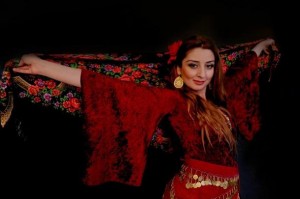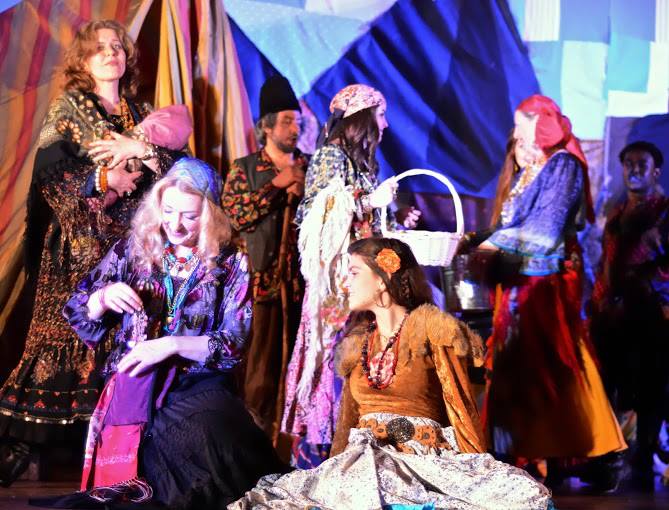Fuse Opera Review: A Gripping Production of Rachmaninoff’s Unjustly Neglected “Aleko”
Despite its drawbacks, “Aleko” is a remarkably satisfying opera and filled with much beautiful music.
By Jonathan Blumhofer.

Soprano Knarik Nerkararyan sings the role of Zemfira in the Commonwealth Lyric Theater’s Rachmaninoff opera “Aleko.” Photo: Marco Kevorkian.
It may be a city with just one full-time opera company, but Boston is the place to be for opera of late: in May, John Harbison’s The Great Gatsby received its belated local premiere (to be reprised in July at Tanglewood), and this month the Boston Early Music Festival is presenting an acclaimed run of Handel’s rarely performed and early (he was 19 when he wrote it) Almira. Add to the mix Commonwealth Lyric Theater’s (CLT) production (closed) of the 17-year-old Sergei Rachmaninoff’s one-acter, Aleko, and opera fans have had quite the selection to choose from.
Like Bizet’s Carmen, the story of Aleko is drawn from Pushkin’s narrative poem, “The Gypsies.” Keeping with the themes of love, jealousy, betrayal, and the behavior triggered by their intersection, it’s a rather grim piece: the titular character is married to Zemfira, a woman whose affections have since passed from him to a Young Gypsy; after being mocked by his wife and catching her with her lover, Aleko kills them both and is subsequently banished from the gypsy camp.
Rachmaninoff’s music for Aleko draws substantially on the Russian operatic tradition of Glinka, Borodin, and—above all—Tchaikovsky. That’s not to say that the music lacks in depth of expression or color, just that the qualities of Rachmaninoff’s mature style are somewhat veiled. The moments that anticipate his later work—the rich, modal writing in the opening chorus and a yearning, recurring appoggiatura motive, among them—are striking, but the overall stylistic feel of the piece is one of indebtedness to Rachmaninoff’s musical elders.
In an effort to diminish the sometimes-dutiful quality of Aleko’s structure (solos, ensemble numbers, and choruses following one up on another), CLT’s production interpolated gypsy songs and dances into the opera, all deftly orchestrated by Moshe Schulman. Indeed, these added a welcome jolt of energy and authenticity to Thursday’s performance, even if they didn’t always quite fit with Rachmaninoff’s own music (he didn’t draw on folk influences as obviously as others).
Despite its drawbacks (and, in truth, Aleko has fewer problems than many established operas by more mature composers), Aleko is a remarkably satisfying opera and filled with much beautiful music. That it hasn’t been performed complete on these shores since 1916 is baffling, but perhaps the strong results of CLT’s production will help it gain greater traction, at least in the region.
On Thursday, baritone Wesley Thomas made a surprisingly sympathetic Aleko. Though his vibrato sometimes obscured pitch and his upper range sounded a little thin, Thomas’s Aleko was far more human than the one-dimensional character he appears to be on the page: this Aleko was a vulnerable, tortured cuckold, his actions foreordained by both his circumstances and surroundings.
As the doomed couple, Zemfira and the Young Gypsy, soprano Knarik Nerkararyan and tenor Jonas Budris, respectively, formed a winning combination. Nerkararyan’s account of Zemfira’s song taunting Aleko seethed with spite and power, while Budris’s delivery of the Young Gypsy’s romance was sweetly lyrical and appealingly poetic. Both of these young singers, one expects, have bright futures ahead of them. Alexander Prokhorov and Anne Bryne also did commendable work in the smaller roles of, respectively, the Old Man (Zemfira’s father) and the Old Gypsy.
In general the chorus sang well, though there were moments in which their sound was a bit strained: the final chorus (which extends Rachmaninoff’s original ending, adding the gypsy song “Solnyshko”) sounded a little raw and might have benefited from greater dynamic restraint and nuance. Its last verse, though, was power-packed.
The orchestra, an ensemble of Boston freelancers, was superb. Though not a large group, they never sounded small, and all sections acquitted themselves well. Conductor Lidiya Yankovskaya superintended over everything with a sure hand, managing good balances and coordination between the widely spaced forces.
The production in Brighton’s Center Makor made the most of a tough staging situation. The hall has no pit, so the orchestra was placed off to one side while most of the action unfolded onstage and on sets on the left-hand side of the theater. Additionally, the whole space was dotted with barrels, bales of hay, colorful fabrics, and other accouterments of gypsy life that placed the audience square in the middle of the action. Anna Kravets’s stage direction further involved the audience by having the chorus stream in through various entrances at the beginning of the opera and the big dramatic moment—Aleko spying on Zemfira and the Young Gypsy together—unfolded with Aleko pacing up and down the theater’s central aisle.
All this combined to form a gripping, concise (Thursday’s performance ran just over an hour) performance of an unjustly neglected piece that, one hopes, will begin turning up with greater frequency in coming years.

